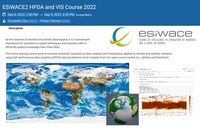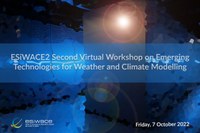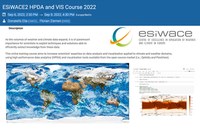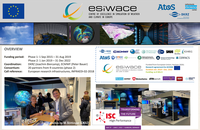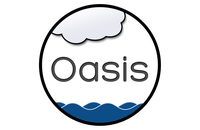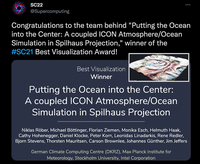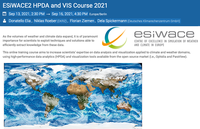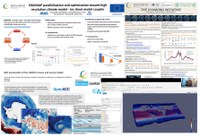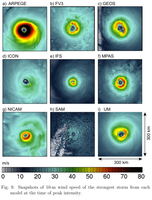Are you interested in knowing more about the latest ESiWACE developments?
- Subscribe to the ESiWACE3 Community and receive the latest news about ESiWACE3 in your email Inbox.
- You can also subscribe to our quarterly Newsletter or take a look at the previous issues.
HPDA & Visualisation training 2022 successfully completed
In this third and final ESiWACE2 online training on High Performance Data Analytics (HPDA) and Visualisation, more than 50 registered participants from 17 countries learned the ropes of HPDA and visualisation using Ophidia, PyOphidia and ParaView.
Submit your DYAMOND papers for Special Edition of JMSJ/SOLA
JMSJ and SOLA call for papers on meteorology, climate and environmental science conducted with high-performance computing for their special editions. Submissions are welcome until December 31, 2023!
Register now for the 2nd ESiWACE2 Virtual Workshop on Emerging Technologies!
October 7 will be a day full of inspiring presentations on European exascale hardware, programming models and hardware interplay and machine learning . Be sure to register before 4 October!
View the DYAMOND analysis at UMAP 2022
From 25-29 July 2022, the DYAMOND data analysis will be presented at the 3rd Pan-GASS Meeting, Understanding and Modeling Atmospheric Processes (UMAP 2022) at Monterey, CA, USA.
ESiWACE2 Online training on High Performance Data Analytics and Visualisation from 6 to 9 September, 2022 - registration open
This online training course provides an introduction to data analysis and visualisation applied to climate and weather domains using Ophidia and ParaView.
ISC'22 in Hamburg (DE): ESiWACE poster and DKRZ exhibition booth
At this year's ISC High Performance conference, DKRZ is present with an exhibition booth, which is still open until Wednesday, 1 June at 4:00 pm. For ESiWACE, Erwan Raffin (Atos) has presented a poster on the ESiWACE2 HPC user-service "Model Refactoring and Porting".
ESiWACE contributions to EGU22
EGU22 is under way, with ESiWACE staff co-convening sessions on ML for earth system modelling and high-resolution weather and climate simulation on Monday, Tuesday and Friday.
Congratulations to Dr. Piyush Garg for winning the DYAMOND data analysis contest
The DYAMOND data analysis contest for early career researchers at the 3rd Pan-GASS Meeting, Understanding and Modeling Atmospheric Processes (UMAP 2022), has declared the winner.
ICON-All-Staff-Meeting on June 20-22, 2022
ICON developers and users are invited to join the ICON-All-Staff-Meeting in Offenbach/Heusenstamm (DE), which is co-sponsored by ESiWACE.
ESiWACE at the 7th ENES HPC workshop in Barcelona
The European Network for Earth System modelling (ENES) is gathering experts on HPC in earth system modelling.
DYAMOND data analysis contest at UMAP 2022
ESiWACE suports a DYAMOND data analysis contest for early career researchers at the 3rd Pan-GASS Meeting, Understanding and Modeling Atmospheric Processes (UMAP 2022).
Registration for the 7th ENES HPC workshop in Barcelona is open!
The European Network for Earth System modelling (ENES) is gathering experts on HPC in earth system modelling.
nextGEMS: Let’s hack in Vienna
The Hackathon of our partner project nextGEMS goes into the 2nd Cycle! Registration and stipend application is now open.
Four new projects awarded funding via ESiWACE2 Service 1 call 2021
The Netherlands eScience Center (NLeSC) and Atos have granted four new projects related to climate and earth system modelling through the ESiWACE2 Service 1 call.
New call for Cylc Dedicated User Support is now open!
We are offering 3 person-months of technical assistance for the design, to upgrade or to enhance the implementation of Cylc in your weather or climate model workflow.
New coupler version OASIS3-MCT_5.0 has been released!
A new version of the OASIS coupler, OASIS3-MCT_5.0, is now available! Find out what is new and how to get the tool.
Wanted: Scientific Programmer for in-situ data processing (all genders)
Come work with us! DKRZ is looking for a scientific programmer for in-situ data processing (all genders) to improve the analysis and visualisation workflow with the ICON weather- and climate model and ParaView. Your first year will be within project ESiWACE2. Apply before January 22, 2022!
New call for OASIS3-MCT Dedicated User Support is open!
We are offering 2 person-months of remote assistance for performance or code upgrade of OASIS3-MCT-based coupled climate and weather models.
SC’21 Best Visualization Award for DKRZ, MPI-M, Stockholm University and Intel Corporation
A team of the German Climate Computing Center (DKRZ), the Max Planck Institute for Meteorology (MPI-M), Stockholm University, and the Intel Corporation has received the SC'21 Best Scientific Visualization & Data Analytics Showcase Award for their visualisation “Putting the Ocean into the Center: A coupled ICON Atmosphere/Ocean Simulation in Spilhaus Projection”, which was supported by ESiWACE2.
ESiWACE2 will be contributing to SC21
This year's Supercomputing Conference (SC21) will be held as a hybrid event from 14 to 19 November 2021. Find out about our ESiWACE2-related activities there!
HPDA & Visualisation training 2021 successfully completed
At this year's ESiWACE2 online training on High Performance Data Analytics (HPDA) and Visualisation, more than 60 registered participants from 20 countries gained hands-on experience using ParaView, Ophidia and PyOphidia.
Submit your abstracts for EGU22!
At EGU22, ESiWACE2 colleagues will be co-convening sessions on high-resolution weather and climate simulations and on machine learning for earth system modelling. Submit your abstracts before 12 January 2022, 13:00 CET!
ESiWACE2 Service call for 2022 now open!
We are looking forward to a new phase of supporting weather and climate modeling groups in preparing their codes for new hardware platforms and the upcoming generation of (pre-)Exascale supercomputers. Apply now for our services!
Cylc User Support 2021 allocated to ICM (Poland)
The Interdisciplinary Centre for Mathematical and Computational Modelling in Warsaw, Poland, will receive Cylc User support targeting the workflow of the ICM coupled model.
XIOS User Support 2021 successfully allocated
With 4 proposals submitted to the 2021 call for Dedicated User Support for XIOS within ESiWACE2 User Service 2, the selection committee chose to support both the UK Met Office and Mercator-Ocean/LOCEAN-IPSL with 1 person-month each.
ESiWACE2 contributions to vEGU21
At this year's virtual EGU General Assembly, ESiWACE2 project partners will be co-convening sessions on high resolution modelling of weather and climate and on machine learning for Earth System modelling, as well as contributing to a course on data visualisation.

